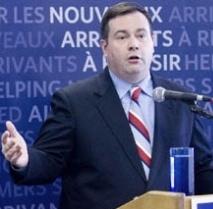Gay and lesbian Iranians who have fled to Turkey often face harassment as they try to find a new country to take them in. Many are applying to Canada and the United States, but their limbo-like status can be made more uncertain while they wait for their refugee applications to be processed in a hostile environment.
On February 20, Immigration Minister Jason Kenney wrote a letter to the United Nations High Commission for Refugees (UNHCR) representative in Canada, urging a faster processing time for those refugees.
The UNHCR will often make a first determination of refugee status before a country like Canada will accept them.
But while Kenney states that more gay and lesbian Iranian refugees could be accepted into Canada under the current targets for refugees coming in through the UNHCR, his department says that there has been no change in policy regarding gay and lesbian refugees.
In recent months, the Immigration and Refugee Board (IRB) has denied the claims of several queer refugees and has deported some to countries like Malaysia and Nigeria.
Opposition MPs say Kenney’s willingness to stand up for queer Iranian refugees, who might otherwise face execution in their home country, is nevertheless a good first step.
“It does show a new openness because the Kulen case was quite brutal,” says NDP MP Thomas Mulcair, who had previously appealed the government in the case of gay Malaysian refugee Kulenthiran Amirthalingam. Kulen was deported in March of last year.
“If Mr Kenney is expressing a change in government policy in that regard then it’s refreshing, and let’s hope that it signals a change for the better in other cases in the future as well,” Mulcair adds.
Helen Kennedy, executive director of queer lobby group Egale Canada, adds the same cautious optimism.
“I think whatever we can do to leverage status for them here, then we should be looking at giving them that option,” Kennedy says. “If they want to come here, then we should be doing everything we can to assist.”
She says more needs to be done to address concerns about the IRB’s decision-making policies.
“There needs to be some sort of formal review,” Kennedy says. “I don’t think that you can just say ‘well, we’re only going to do it for this specific group that happens to be in Turkey at the time’ — there are others. There are people who are currently in this country who are being denied status and being sent back to horrific abuses in their countries of origin.
Kennedy says the board can’t hold a double standard — it needs to be open to all queer refugees who face persecution.
NDP immigration critic Olivia Chow is quick to point out that the IRB is made up of political appointees.
“Some of these political appointees will have done applications via video conference, and the life and death of one refugee is determined by one board member,” Chow says. “The New Democrats have always said that there should be an appeal process … so that decisions are based on law and fact and sometimes not according to perhaps homophobic behaviour of decision makers in [the] Immigration and Refugee Board.”
Chow adds that she has been working with Egale to push for an appeal process to be established.
Liberal immigration critic Maurizio Bevilacqua also believes that these kinds of decisions should adhere to the principles laid out in the Charter of Rights and Freedoms and the Canadian Human Rights Act.
Kenney, meanwhile, was quoted in the Toronto Star as cautioning Canadian-based advocates for these queer Iranian refugees to ensure that their claims were “legitimate,” saying that the IRB has recently rejected a number of refugees based on what it calls fraudulent sexual orientation claims.
For 2009, the Ministry of Ciitizenship and Immigration has a quota of 37,400 claims based on humanitarian grounds.
Read more:
- Bisexual woman waits for decision on deportation to Nigeria: Dec 18, 2008
- Immigration is a hot election issue: Sep 17, 2008
- Quebec NDPer denounces gay deportation: Mar 6, 2008
- Alvaro Orozco denied status, set to be deported Oct 4: Sep 14, 2007


 Why you can trust Xtra
Why you can trust Xtra


